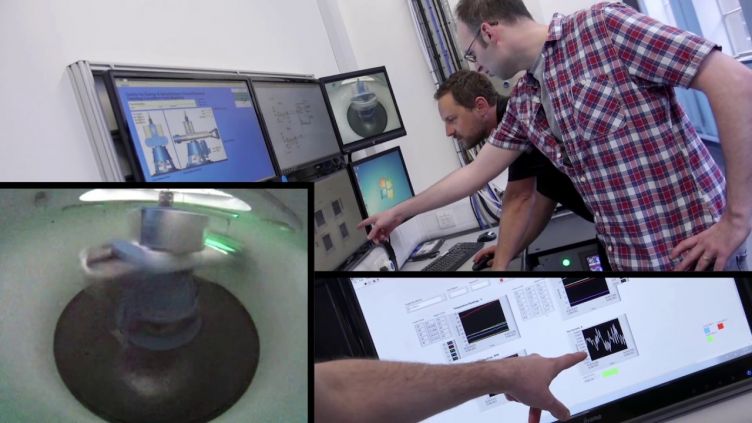Professor Sam Clarke (he/him)
School of Mechanical, Aerospace and Civil Engineering
Professor of Blast Geotechnics
+44 114 222 5703
Full contact details
School of Mechanical, Aerospace and Civil Engineering
Room D121
Sir Frederick Mappin Building (Broad Lane Building)
Mappin Street
Sheffield
S1 3JD
- Profile
-
My research aims to understand the fundamentals of blast impact to save lives and infrastructure.
Dr Sam Clarke
Sam graduated from The University of Sheffield with a MEng (Hons) degree in Structural Engineering and Architecture in 2006.
He then joined the Geotechnical Engineering Group and completed his PhD in advanced numerical modelling in 2009. During his doctorate studies Sam spent a number of periods working with Arup Geotechnics' Numerical Skills Team in London and the university spin-out company LimitState.
He spent a short period as a Research Assistant before taking up the post of Lecturer in Geotechnical Engineering in November 2009.
Over the past decade Sam has spent much time investigating the role of soil in blast events. He works on the fundamental physics that govern the interaction between soil, air and explosive charges.
Soil is a variable material; unlike steel, its behavior is not easy to predict. Understanding the fundamentals enables Sam to make accurate predictions of what the effects of a blast in a particular environment would be.
Understanding the impact of blast on soil, buildings, transport and communication networks can contribute to the design of infrastructure that is more resilient to terrorism. Sam’s work also helps to protect troops, vehicles and structures in warzones.
- Research interests
-
Sam’s research has led to many collaborations with the Defence Science & Technology Laboratory.
He is currently investigating the high stress, high strain-rate response of geomaterials experienced in blast loading events as well as novel techniques for the quantification of the loading in such events.
He is now a core member of the Blast and Impact Dynamics research group.
His main research interests focus on:
- The role of soil in buried explosive events
- Numerical modelling of soil in blast events
- Quantification of rate effects in soils
- Experimental techniques for the measurement of blast loading
- Publications
-
Journal articles
- Characterisation of buried blast loading. Proceedings of the Royal Society A: Mathematical, Physical and Engineering Sciences, 476(2236). View this article in WRRO


- High-pressure compressibility and shear strength data for soils. Canadian Geotechnical Journal, 56(7), 1042-1048. View this article in WRRO


- Predicting the role of geotechnical parameters on the output from shallow buried explosives. International Journal of Impact Engineering, 102, 117-128. View this article in WRRO


- Effects of strain rate and moisture content on the behaviour of sand under one-dimensional compression. Experimental Mechanics, 56(9), 1625-1639. View this article in WRRO


- Design of a split Hopkinson pressure bar with partial lateral confinement. Measurement Science and Technology, 27. View this article in WRRO


- Geotechnical causes for variations in output measured from shallow buried charges. International Journal of Impact Engineering, 86, 274-283. View this article in WRRO


- A large scale experimental approach to the measurement of spatially and temporally localised loading from the detonation of shallow-buried explosives. Measurement Science and Technology, 26. View this article in WRRO


Conference proceedings papers
- Repeatability of Buried Charge Testing. Military Aspects of Blast and Shock 23. Oxford, UK, 7 September 2014 - 12 September 2014. View this article in WRRO


- Characterisation of buried blast loading. Proceedings of the Royal Society A: Mathematical, Physical and Engineering Sciences, 476(2236). View this article in WRRO
- Research group
- Grants
-
Past Grants
Mechanisms & Characterisation of Explosions
The overall aim of MaCE is to develop a comprehensive conceptual model of blast loading which will serve to underpin accurate predictive models for protection engineers.
- PhD opportunities
Understanding Rate Effects In Geomaterials
The purpose of this project will be to conduct experimental work to identify:
- The triaxial behaviour of different geomaterials at a range of loading rates and
- The parameters which affect the geomaterials sensitivity to loading rate
The outcome of this work will be well validated material models which can be used in computational analysis models to predict the response of protection systems to intense transient loading.
Predicting The Impulse From Buried Charges
To date, no-one has attempted to synthesise all the disparate data sources into a single complied dataset to allow for a meta-analysis to be conducted. This will involve collating data from the literature and from the Sheffield Blast tests in an attempt to model and predict the output of shallow buried charges. This data can then be fed into the Sheffield predictive model for blast behaviour, which is detailed in the paper linked to below.
Shock Transmission Through Geological Materials
The aim of the PhD will be to investigate the 3 zone model below. It is expected that zones 1 and 3 will be of lesser interest and zone 2 is where the work will be focussed.
- Zone 1: Cratering- total compaction of the layer with the material being ejected. This is assuming that the initial source is buried. For an above ground burst it is highly likely that cratering will not occur. It is proposed that this is covered by a focussed literature review.
- Zone 2: Dynamic compaction and shock propagation using the Split-Hopkinson Pressure Bar (Kolsky Bar) apparatus.
- Zone 3: Elastic shock propagation - traditional earthquake mechanics, soils can and have previously been quantified using "bender" element tests. It is proposed that this is covered by a focussed literature review.
If you're interested in one of these projects or would like to self-propose a project, please contact Sam on the email above. Current PhD opportunities in the department can be viewed here.

